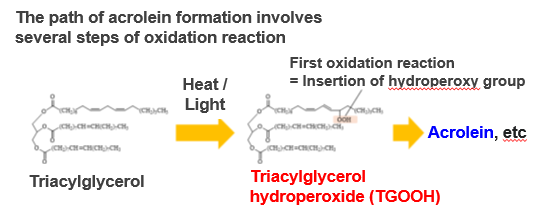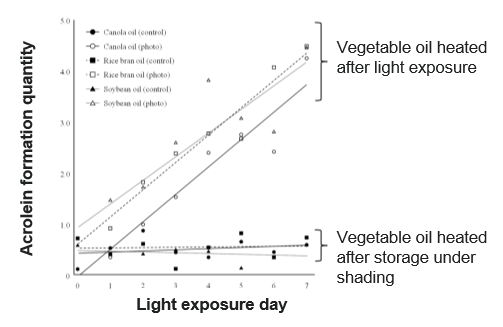Method to evaluate the acrolein producing capacity of fat and oil
Evaluation of cause and oxidation level of fat and oil to apply to anti-oxidation measure
Overview
Acrolein, a highly toxic type of aldehyde, is formed by oxidation of polyunsaturated fatty acid in edible fat and oil, and it is said to be one of the causes of “oil sickness”. It is known that the structure of fatty acid hydroxyperoxide isomer produced by oxidation of unsaturated fatty acid depends on the oxidation mechanism (radical oxidation, singlet oxygen oxidation) [1], and these differences in isomer structure, that is to say the oxidation mechanism, may be involved in the formation of acrolein. Although the contribution of thermal oxidation (radical) of linolenic acid has been known as one of the sources of acrolein, the contribution of photo oxidation (singlet oxygen) has rarely been examined. The contribution of fatty acid other than linolenic acid (such as linoleic acid, etc.) to singlet oxygen oxidation is also unknown. If the oxidation and degradation paths of unsaturated fatty acid can be identified, it will be possible to specify which unsaturated fatty acid in edible oil and fat is responsible for the acrolein formation due to oxidative degradation, which is expected to contribute to the technology development for quality control and stability improvement of edible oil and fat.
This invention is about a method to evaluate the ability to produce acrolein and the degradation of fat and oil, based on the elucidation of the oxidation and degradation paths of unsaturated fatty acid in fat and oil [2].

Acrolein is formed by photo oxidation (singlet oxidation)

Product Application
・Quality control of fat and oil
・Container development for fat and oil
Related Works
[1] Shunji Kato et al. NPJ Science of Food, 2 (2018)
[2] Shunji Kato et al. NPJ Science of Food, 6 (2022)
IP Data
IP No. : JP2022-028235
Inventor : KATO Shunji, NAKAGAWA Kiyotaka
keyword : Agriculture, Food item
